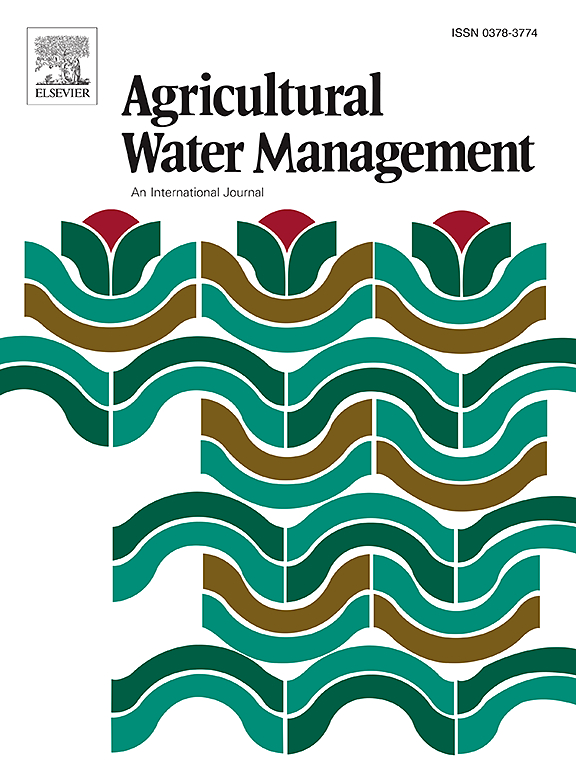Functional roles of plant growth-promoting rhizobacteria in ungrafted and grafted watermelons under various deficit irrigation strategies
IF 6.5
1区 农林科学
Q1 AGRONOMY
引用次数: 0
Abstract
Drought is the central abiotic stressor limiting agricultural sustainability in arid and semi-arid regions. Plant growth-promoting rhizobacteria (PGPR) can play a key role in drought resistance in many vegetables including watermelon. This study examined the effects of two distinct PGPRs (Pseudarthrobacter polychromogenes and Paenarthrobacter aurescens) secreting 1-aminocyclopropane-1-carboxylic acid (ACC) deaminase on yield, yield traits, fruit quality, and crop water stress index (CWSI) in watermelons of ungrafted and grafted (onto wild watermelon rootstock) under various deficit irrigation methods over the course of 2-year field trials in 2023 and 2024. This study results showed that increased water stress caused significant fruit yield loss. In both grafted and ungrafted plants, continuous severe water stress (CSWS) conditions led to yield loss of approximately 40 % by comparison to non-water stress (NWS). PGPRs produced varied results in grafted and ungrafted plants. Under CSWS, the wild watermelon rootstock interacted with rhizobacteria, particularly P. aurescens, increasing yield by up to 20 % compared to plants without PGPR. In grafted plants, P. aurescens increased irrigation water use efficiency (IWUE) by approximately 21 % under CSWS irrigation strategy. PGPRs were more effective under severe water stress than mild and moderate water stress, and they significantly protected watermelon from the damaging effects of water stress. PGPRs did not significantly affect the physical properties of watermelon fruits, including weight, width, length, rind thickness, and flesh color. However, they increased the soluble solids content in ungrafted plants and total phenolic compounds in grafted plants. Conversely, P. aurescens reduced the sucrose content in the fruit, resulting in a drop in the total sugar content of fruits produced in the presence of this bacterial species. The mean CWSI values of watermelon varied considerably under different deficit irrigation strategies, and increasing water stress caused CWSI values to rise. CWSI threshold were found higher in grafted plants (0.20) than in ungrafted plants (0). This study provides a theoretical basis for rootstock-PGPR synergistic regulation for efficient water-saving in cultivation of watermelon in water stressed environments.
不同亏缺灌溉策略下,促生根瘤菌在未嫁接和嫁接西瓜中的功能作用
干旱是制约干旱半干旱区农业可持续发展的主要非生物胁迫源。促进植物生长的根瘤菌(PGPR)在包括西瓜在内的许多蔬菜的抗旱性中起着关键作用。通过2023年和2024年2年的田间试验,研究了分泌1-氨基环丙烯-1-羧酸(ACC)脱氨酶的两种不同的PGPRs(多色伪节杆菌和多色拟节杆菌)对不同亏缺灌溉方式下未嫁接和嫁接西瓜(野生西瓜砧木)产量、产量性状、果实品质和作物水分胁迫指数(CWSI)的影响。研究结果表明,水分胁迫的增加会造成显著的果实产量损失。在嫁接和未嫁接的植株中,与非水分胁迫(NWS)相比,持续的严重水分胁迫(CSWS)条件导致产量损失约40% %。PGPRs在嫁接和未嫁接植物中产生不同的结果。在CSWS下,野生西瓜砧木与根瘤菌,特别是鹅毛假单胞菌相互作用,产量比没有PGPR的植株提高了20% %。在嫁接植物中,在CSWS灌溉策略下,金菖蒲提高了灌溉用水效率(IWUE)约21. %。在重度水分胁迫下,PGPRs比轻度和中度水分胁迫下更有效,并能显著保护西瓜免受水分胁迫的危害。PGPRs对西瓜果实的重量、宽度、长度、果皮厚度和果肉颜色等物理性状影响不显著。然而,它们增加了未嫁接植株的可溶性固形物含量和嫁接植株的总酚类化合物含量。相反,金黄色葡萄球菌降低了果实中的蔗糖含量,导致在这种细菌存在的情况下产生的果实的总糖含量下降。不同亏缺灌溉策略下西瓜平均CWSI值差异较大,水分胁迫的增加导致CWSI值升高。嫁接植株的CWSI阈值(0.20)高于未嫁接植株(0)。本研究为缺水环境下砧木- pgpr协同调控西瓜高效节水提供了理论依据。
本文章由计算机程序翻译,如有差异,请以英文原文为准。
求助全文
约1分钟内获得全文
求助全文
来源期刊

Agricultural Water Management
农林科学-农艺学
CiteScore
12.10
自引率
14.90%
发文量
648
审稿时长
4.9 months
期刊介绍:
Agricultural Water Management publishes papers of international significance relating to the science, economics, and policy of agricultural water management. In all cases, manuscripts must address implications and provide insight regarding agricultural water management.
 求助内容:
求助内容: 应助结果提醒方式:
应助结果提醒方式:


